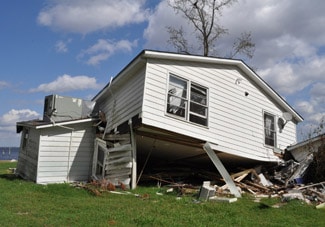7 tips for filing a first-time home insurance claim
If you’ve never filed a home insurance claim, don’t breathe too easily. You’re more likely to file a home insurance claim than you are to be struck by lightning during your life.
An insurance claim was filed for six of every 100 insured U.S. homes in 2009, according to the Insurance Information Institute. By comparison, your odds of being struck by lightning sometime in your life are 1 in 10,000.
With those odds, you should educate yourself about filing a claim if you own and insure a home. Here are seven tips for filing a first-time home insurance claim.
1. File a police report.
If a burglary or theft has occurred at your home, notify the police as soon as possible, says Loretta Worters, a spokeswoman for the nonprofit Insurance Information Institute.
2. Inform your insurer.
After calling the police (if necessary), the next call should be to your insurance agent or company. “Insurance policies place a time limit on filing claims,” Worters says. “So it’s important to place that call as soon as possible after a loss.”
3. Ask lots of questions.
 Mary Bonelli, a spokeswoman for the nonprofit Ohio Insurance Institute, says questions you should ask your insurance agent or company include:
Mary Bonelli, a spokeswoman for the nonprofit Ohio Insurance Institute, says questions you should ask your insurance agent or company include:
• Am I covered?
• Does my claim exceed my deductible?
• What will I need to file a claim?
• How long will the claims process take?
4. Make a list.
“You’ll likely need to list or document all the items that were lost or compromised as a result of the damage,” Bonelli says.
The best way to do that is with a home inventory. The Insurance Information Institute offers a free home inventory at www.knowyourstuff.org. Bonelli says you also can give written, photographic and video documentation to your insurance company.
“One of the biggest mistakes I see is homeowners not documenting all damages properly. The insurance company will not pay for any item not listed or claimed, so when you’re creating an inventory, make sure to list the big items as well as all the little things,” says Bob Freitag, president of AmeriClaims Inc., a company in Charlotte, N.C., that helps consumers with insurance claims.
5. Seek authorization for immediate repairs.
“If the damage is severe, tell the agent that you need someone to shore up or board up the property to prevent additional losses. If you choose to do this yourself, keep all receipts, because this type of expense is usually reimbursable,” Bonelli says.
6. Be aware of the role that technology plays.
Instead of sending a company-employed adjuster to examine damage to your home, insurers now rely mainly on software to estimate the cost of materials and labor for repair or your belongings for replacement.
“Insurers no longer send an adjuster to a home to take a written (damage) estimate, unless there is a total or catastrophic loss like a major fire or hurricane,” says Douglas Nadeau, a spokesman for State Farm.
Worters says the estimating software helps insurance companies handle claims “more efficiently and effectively.”
Freitag says that although many insurance companies use software to value buildings and personal property, these programs don’t always accurately reflect the value of what was lost.
“Insurance companies may offer to replace what you lost with lower-quality items. This can often lead to your home insurance company offering a lower settlement, or not enough funds to replace items with the kind and quality you had before the disaster,” Freitag says.
Lynette Simmons Hoag, an attorney who handles insurance cases at Hoag Law Group LLC in Chicago, says she has seen clients’ personal property under-valued and building costs underestimated by insurers’ software programs.
“Most people simply accept what the insurance company offers based upon the computerized systems, but it’s important to know you don’t have to just accept that amount if you can document a higher loss,” Freitag says.
7. Comb through your policy to find out your rights.
“You often have options to fight the estimate for property claims under the policy’s ‘appraisal clause.’ In some cases, the insurance company will consider comparables for property damage, which are similar items like the one damaged or lost that are for sale in the same area,” Hoag says.
Freitag says that if you disagree with the amount of money that your home insurer offers to pay for damage to your home, you can consult a contractor to estimate the repair costs. Many contractors will provide free estimates. If a contractor’s estimate is higher than what the insurance company is offering, ask your insurance company for a list of contractors willing to do the repairs for the amount offered by the insurance company. Being armed with an estimate from a local contractor will help you negotiate with your insurance company, Freitag says.
“If your insurer cannot provide a local contractor who will do the repairs for the amount they’re offering, then question the proposed settlement amount with the insurance company and stress that you feel you deserve more money than they’re offering,” he says. “And don’t be afraid to stress you want the work performed by the contractor of your choice that you trust.”